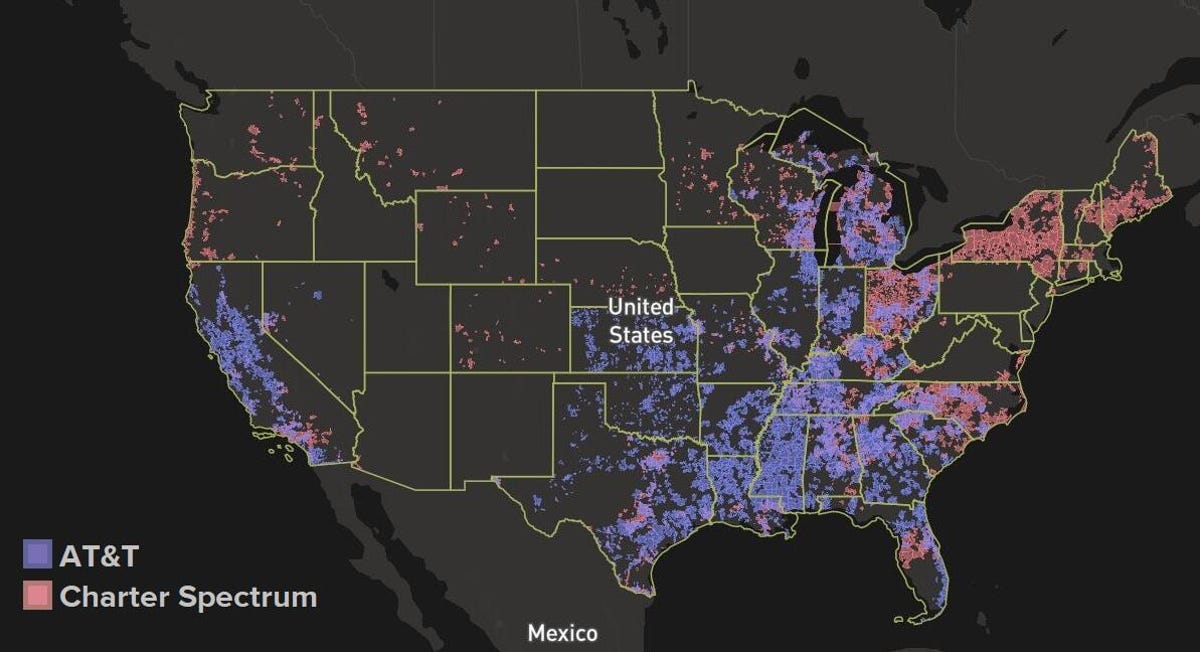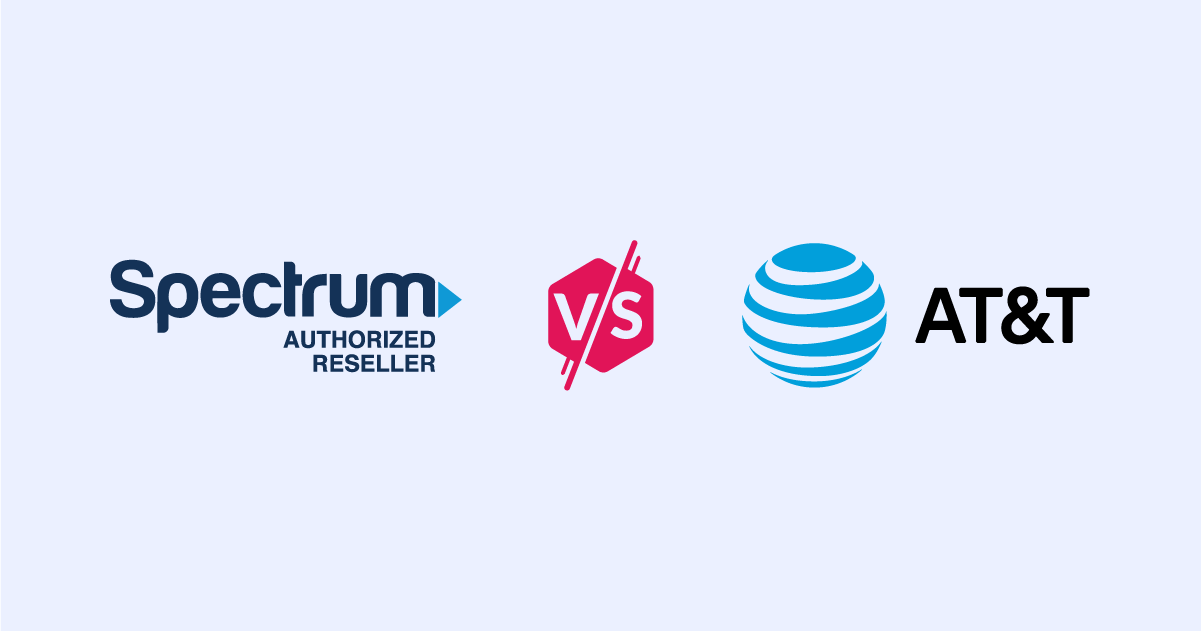AT&T Fiber and Verizon Fios are often considered better than Spectrum. They offer faster speeds and more reliable connections.
Choosing the best internet provider depends on various factors like speed, reliability, and customer service. AT&T Fiber and Verizon Fios stand out due to their superior fiber-optic technology. They deliver faster download and upload speeds compared to Spectrum’s cable internet.
Fiber-optic connections are more reliable and experience fewer slowdowns during peak hours. Many users also report higher satisfaction with customer support from these providers. Availability may be limited in some areas, so it’s essential to check local service options. Overall, for those seeking top-notch internet performance, AT&T Fiber and Verizon Fios are excellent alternatives to Spectrum.

Credit: www.cnet.com
Introduction To Internet Service Providers
Choosing the right Internet Service Provider (ISP) is crucial. The quality of your internet affects work, entertainment, and communication. There are many ISPs available, each offering different plans and features. This post helps you identify better options than Spectrum.
Importance Of Choosing The Right Isp
Reliable internet is essential for streaming, gaming, and remote work. A good ISP provides fast speeds and minimal downtime. Ensure your ISP offers excellent customer support. Compare different ISPs to find one that meets your needs and budget.
- Speed: Ensure you get the speeds you pay for.
- Customer Service: Check reviews for support quality.
- Reliability: Look for ISPs with minimal outages.
A good ISP makes a big difference in your daily online activities. Choose wisely for a better internet experience.
Common Issues With Spectrum
Spectrum often faces complaints from users. Common issues include:
| Issue | Description |
|---|---|
| High Prices | Many users feel Spectrum’s plans are overpriced. |
| Slow Speeds | Users often experience slower speeds than advertised. |
| Poor Customer Service | Complaints about unhelpful support are common. |
| Frequent Outages | Users report frequent and long-lasting outages. |
These issues make it important to look for better alternatives.
Fiber Optic Internet
Fiber optic internet is a modern technology that offers high-speed internet. It uses light to transfer data, making it faster and more reliable. This technology is becoming popular as more people seek better internet solutions.
Advantages Of Fiber Optic
Fiber optic internet has many advantages over traditional internet services. Here are some key benefits:
- Speed: Fiber optic internet can reach speeds of up to 1 Gbps. This is much faster than typical cable or DSL connections.
- Reliability: Fiber optic cables are less prone to interference. This means a more stable and consistent connection.
- Bandwidth: Fiber can handle more data at once. This is ideal for families with multiple devices.
- Latency: Lower latency means less delay. This is great for online gaming and video calls.
Top Fiber Optic Providers
Here are some of the top fiber optic internet providers in the market:
| Provider | Speed | Coverage Area |
|---|---|---|
| Verizon Fios | Up to 940 Mbps | Available in select cities |
| AT&T Fiber | Up to 1 Gbps | Expanding in major cities |
| Google Fiber | Up to 1 Gbps | Limited to specific areas |
| CenturyLink Fiber | Up to 940 Mbps | Available in various regions |
These providers offer competitive speeds and reliability. Choosing the right one depends on your location and needs.
Cable Internet Alternatives
Finding the best internet can be hard. Spectrum is popular, but there are other options. Cable internet alternatives can offer more speed and better reliability.
Benefits Of Cable Internet
Faster speeds are a major benefit of cable internet. It supports high-definition streaming and gaming. Cable internet often has lower latency. This is good for video calls and online games.
Many cable providers offer bundles with TV and phone services. This makes managing bills easier. Most cable internet plans have no data caps. You can surf the web as much as you want.
Leading Cable Providers
| Provider | Download Speed | Upload Speed | Price |
|---|---|---|---|
| Comcast Xfinity | Up to 1 Gbps | Up to 35 Mbps | Starts at $29.99/month |
| Cox Communications | Up to 940 Mbps | Up to 35 Mbps | Starts at $29.99/month |
| Spectrum | Up to 200 Mbps | Up to 10 Mbps | Starts at $49.99/month |

Credit: www.reddit.com
Dsl Internet Options
DSL internet is an affordable alternative to Spectrum. It uses existing phone lines. This makes it widely available in many areas. It offers decent speeds for everyday use. Let’s explore its advantages and disadvantages. We’ll also look at some recommended providers.
Pros And Cons Of Dsl
| Pros | Cons |
|---|---|
|
|
Recommended Dsl Providers
- AT&T DSL: Offers reliable service with various speed options. They provide good customer support. Plans are affordable for most users.
- Frontier DSL: Known for competitive pricing and no data caps. Suitable for families and small businesses. Good for basic internet needs.
- CenturyLink DSL: Provides wide coverage in rural areas. They offer no-contract plans. Speeds are consistent and reliable.
Choosing a DSL provider can be easy. Look at pricing, speed, and customer reviews. DSL is a solid option for many users.
Satellite Internet Choices
Choosing the right Internet can be overwhelming. If you’re considering options other than Spectrum, satellite Internet might be a good choice. Here, we explore the benefits, best providers, and when it’s the right time to switch to satellite Internet.
When To Consider Satellite
Satellite Internet works well in rural areas. These places often lack wired Internet services. It’s also useful for mobile homes or RVs. If you need Internet while traveling, satellite can be a smart choice.
Satellite Internet doesn’t need cables or phone lines. This makes it easier to install. It’s a good option for people who move often. Additionally, it’s reliable in remote locations. This is ideal for people who live off the grid.
Best Satellite Internet Providers
There are several top providers to consider. Here’s a quick look at the best options:
| Provider | Speed | Data Cap |
|---|---|---|
| Viasat | 12-100 Mbps | 40-150 GB |
| HughesNet | 25 Mbps | 10-50 GB |
| Starlink | 50-150 Mbps | Unlimited |
Viasat offers flexible plans. They have good speeds and high data caps. HughesNet is another solid option. They offer consistent speeds but lower data caps. Starlink is the newest player. They offer high speeds and unlimited data.
Each of these providers has its strengths. Choose the one that fits your needs best. Whether you need speed, data, or reliability, there’s a satellite provider for you.

Credit: www.highspeedinternet.com
Fixed Wireless Internet
Fixed Wireless Internet is a fantastic alternative to traditional cable. It provides reliable and fast internet, often surpassing what Spectrum offers. This solution uses radio signals instead of cables, making it ideal for rural areas.
How Fixed Wireless Works
Fixed Wireless Internet uses radio signals to deliver internet services. A tower transmits the signal to a receiver on your home. The receiver then connects to a router, providing internet access. This method bypasses the need for cables.
No digging is required for installation, making it faster and less invasive. Line of sight is crucial for this technology. The receiver must have a clear view of the transmission tower. Trees, buildings, and hills can interfere with the signal.
Top Fixed Wireless Providers
Several providers offer Fixed Wireless Internet, each with unique features. Here are some of the top options:
| Provider | Speed | Coverage | Special Features |
|---|---|---|---|
| Rise Broadband | Up to 50 Mbps | Rural and urban areas | No data caps |
| AT&T Fixed Wireless | Up to 25 Mbps | Rural areas | Bundling options |
| Verizon LTE Home Internet | Up to 50 Mbps | Urban areas | Unlimited data |
| UbiFi | Up to 50 Mbps | Rural areas | Portable service |
Rise Broadband offers speeds up to 50 Mbps with no data caps. AT&T Fixed Wireless provides up to 25 Mbps and bundling options. Verizon LTE Home Internet delivers speeds up to 50 Mbps with unlimited data. UbiFi offers portable service with speeds up to 50 Mbps.
Comparing Internet Speeds
Choosing the best internet service can be challenging. Different providers offer various speeds and features. Let’s explore how different providers compare, especially against Spectrum.
Speed Requirements For Different Activities
Internet speed needs vary by activity. Here’s a guide to what speeds you need:
| Activity | Minimum Speed |
|---|---|
| Checking Email | 1 Mbps |
| Browsing the Web | 5 Mbps |
| Streaming HD Video | 10 Mbps |
| Online Gaming | 25 Mbps |
| Streaming 4K Video | 50 Mbps |
How Different Isps Stack Up
Let’s compare the speeds of various Internet Service Providers (ISPs) with Spectrum.
- Spectrum: Offers speeds up to 200 Mbps. Suitable for most activities.
- Google Fiber: Provides speeds up to 1 Gbps. Excellent for heavy users.
- Verizon Fios: Speeds range from 200 Mbps to 940 Mbps. Reliable for large families.
- AT&T Fiber: Offers speeds up to 1 Gbps. Ideal for streaming and gaming.
Choosing the right ISP depends on your needs. For basic use, Spectrum is sufficient. For more demanding tasks, consider other ISPs.
Customer Service And Reliability
Choosing the best Internet Service Provider (ISP) involves many factors. Two of the most crucial factors are customer service and reliability. Let’s delve into what makes these elements so vital and how various ISPs fare.
Importance Of Customer Service
Good customer service can make or break your experience with an ISP. Imagine having Internet issues and no one helps. That’s frustrating! A helpful support team can solve your problems quickly.
Here are some reasons why customer service is essential:
- Quick Issue Resolution: Fast solutions save you time and stress.
- Technical Support: Knowledgeable staff can guide you through technical difficulties.
- Friendly Service: Polite staff make interactions pleasant and less stressful.
- 24/7 Availability: Round-the-clock help ensures problems get fixed anytime.
Reliability Ratings Of Various Isps
Reliability is another key factor. You need an ISP that provides a stable connection. Frequent outages can disrupt work, study, and entertainment.
Here’s a table showing the reliability ratings of various ISPs:
| ISP | Reliability Rating |
|---|---|
| Verizon Fios | 4.8/5 |
| AT&T Internet | 4.5/5 |
| Xfinity | 4.3/5 |
| Spectrum | 3.9/5 |
Verizon Fios and AT&T Internet lead in reliability. Spectrum’s rating is lower, highlighting some concerns.
Reliable Internet ensures smooth online experiences. High reliability ratings mean fewer disruptions. Choose an ISP with strong customer service and high reliability for the best experience.
Cost Considerations
Choosing an internet provider involves more than just speed and reliability. Cost considerations play a significant role. Here, we discuss how pricing structures and hidden fees can impact your decision.
Pricing Structures
Different providers have different pricing structures. Below is a comparison table of popular providers and their pricing plans:
| Provider | Basic Plan | Mid-Tier Plan | Premium Plan |
|---|---|---|---|
| Provider A | $30/month | $50/month | $70/month |
| Provider B | $25/month | $45/month | $65/month |
| Provider C | $35/month | $55/month | $75/month |
Spectrum’s pricing might seem competitive at first glance. Yet, other providers offer more value for money. Always compare the features and benefits included in each plan.
Hidden Fees To Watch Out For
Many internet providers, including Spectrum, have hidden fees. These can add up quickly.
- Installation Fees: Some providers charge a one-time fee for installation.
- Equipment Rental Fees: Monthly charges for modem and router rentals.
- Early Termination Fees: High charges if you cancel your contract early.
- Data Overages: Extra charges if you exceed your data limit.
Before choosing a provider, read the fine print. Ensure you understand all potential costs. This will help you avoid surprises on your bill.
Conclusion And Recommendations
Finding the best Internet service is crucial for a seamless online experience. Spectrum is popular, but other providers might better fit your needs. Here are some top alternatives and final thoughts to help you decide.
Best Alternatives To Spectrum
Several Internet service providers offer excellent alternatives to Spectrum. Consider these options:
| Provider | Key Features | Availability |
|---|---|---|
| Xfinity |
|
Available in most urban areas |
| Verizon Fios |
|
Available in select regions |
| AT&T Internet |
|
Wide national coverage |
| Google Fiber |
|
Limited cities |
Final Thoughts
Choosing the right Internet service depends on several factors. Evaluate your needs and compare the options. Speed, reliability, and customer service are key considerations. Whether you choose Xfinity, Verizon Fios, AT&T, or Google Fiber, each has unique benefits.
Always check the availability in your area before making a decision. The right provider will enhance your online activities and provide a smoother experience.
Frequently Asked Questions
What Are The Best Spectrum Alternatives?
Several great alternatives to Spectrum include Verizon Fios, AT&T Fiber, and Google Fiber. They offer faster speeds, competitive prices, and reliable services. Compare them based on your needs.
Is Verizon Fios Better Than Spectrum?
Yes, Verizon Fios often outperforms Spectrum in speed and reliability. Fios offers fiber-optic connections, which are generally faster and more stable than cable.
How Does At&t Fiber Compare To Spectrum?
AT&T Fiber typically offers faster and more consistent internet speeds compared to Spectrum. AT&T’s fiber-optic service is also known for better reliability and customer satisfaction.
What Makes Google Fiber A Good Choice?
Google Fiber provides extremely fast internet speeds and excellent customer service. Its fiber-optic network offers one of the best internet experiences available today.
Conclusion
Finding a better internet provider than Spectrum depends on your specific needs and location. Consider speed, reliability, and customer service. Research alternatives like AT&T, Verizon, or Xfinity. Each has unique offerings that might better suit your requirements. Make an informed decision to enhance your online experience.
